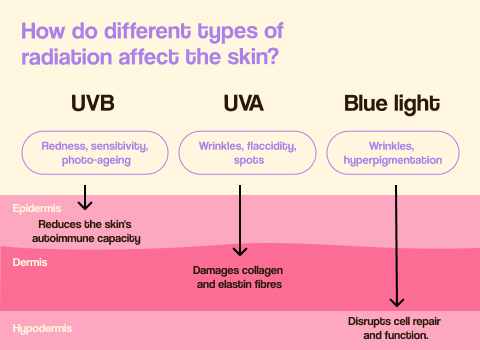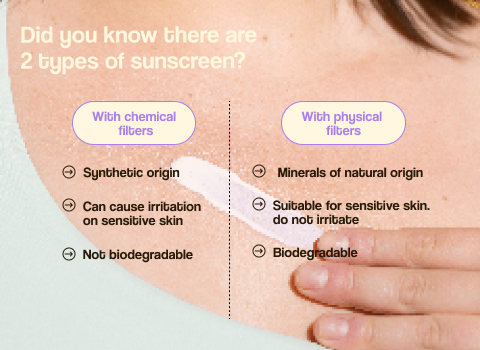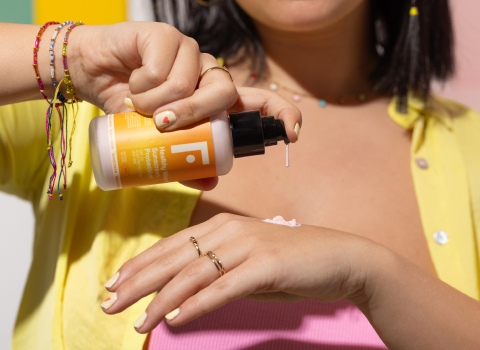Healthy Mineral Sunscreen Protection
Facial and body sun cream - 50/100ml
Not sure what to look for? You can start from here:

Here are your essentials
for making it this far
In this post we want to help you understand the closely related concepts to sunscreen such as SPF, broad-spectrum, physical filters...
But before that, the first thing you should know is that your last year's sunscreen won't work for this spring-summer, we're sorry, it's time to "refresh your sunscreen wardrobe". Don't worry, we have a justification for this - your sunscreen has an expiration date, once opened and after about 6 months (PAO), it starts to lose effectiveness and there is a risk of skin burns or irritations because it won't protect you from the sun in the same way as when you bought it.
In addition, we will tell you about the myths and truths about sunscreens, and the benefits of using sunscreens formulated with natural ingredients. You'll be interested in this, don't miss it!
True. It stands for "sun protection factor", meaning it is the protection factor against solar radiation that a sunscreen provides. You will recognize it because it is the number that always appears on the packaging of sunscreens: 15, 30, 50...
This protection factor indicates the time during which a sunscreen increases the natural defense capacity of the skin, before producing any effect such as burns or redness. Therefore, the SPF multiplies the time that the skin can be exposed to solar radiation and effectively protected. That is, if your skin burns or turns red after being exposed to the sun without protection for 5 minutes, a sunscreen with SPF 15 will multiply by 15 the time we can be exposed to the sun and protected (5x15= 75 min of protection). The higher the number, the longer the protection time.
It's not really like that, the protection is actually the same whether it's SPF 15 or SPF 30. Don't be shocked by this statement! As we said, the protection factor refers to time, so the truth is that with a higher SPF, your skin will be protected for a longer time effectively. So you can enjoy the sun without having to reapply the sunscreen as often. With SPF 50, you can stay worry-free for 2 hours. But be careful! Don't rely on it and let hours go by without reapplying your sunscreen, because the best way to ensure that your skin is protected is to reapply it after getting wet, sweating, or drying off with a towel, and even if you get in the habit of reapplying your sunscreen every 2 hours, your skin will thank you and you won't take any risks!
But be careful! Don't let the hours pass without reapplying your sunscreen, because the best way to ensure that your skin is protected is to reapply it after getting wet, sweating, or drying off with a towel, and even if you make it a habit to reapply your sunscreen every 2 hours, your skin will thank you and you won't take any risks!
Solar radiation is electromagnetic energy coming from the sun. It provides light and warmth to Earth and energy for photosynthesis. This energy is necessary for the metabolism of the environment and its inhabitants. UV radiation is beneficial, allowing the synthesis of vitamin D and endorphins. However, repeated and uncontrolled exposure can cause skin damage.
UV radiation comes from the sun and is one of the main causes of skin ageing, but recent studies have paid special attention to the damages caused by high-energy visible light (HEV), which includes blue light. Its main emitter is the sun, but there are additional sources like digital screens of phones, computers, TVs, and LEDs. Exposure to this type of blue light has increased with the use of these electronic devices.

Every day, you are exposed to different types of radiation. Your eyes can't see it, but your skin feels it!
Sunscreens containing titanium dioxide and zinc protect against UVA and UVB rays, but provide limited protection against HEV light (blue light), for which the cosmetic industry is developing other types of specific protective agents.
Sign up to our newsletter to find out about all the news before anyone else. Spoiler! Something new is coming…
True. That's right, look for a broad-spectrum sunscreen, but why? We'll tell you now.
Broad-spectrum protection is one that effectively protects us from the UVB, UVA, visible light, and IR radiation spectrum. In other words, with a broad-spectrum sunscreen, we will be protecting our skin from all the radiation that the sun emits. It is especially important to protect ourselves from UVA and UVB rays that penetrate the ozone layer and can affect our skin.
Sunscreens are ingredients capable of blocking ultraviolet rays from the sun and are classified into two groups: chemical/organic filters or physical/inorganic filters. Let's delve a little deeper to get to know them better.
- Chemical sunscreens are those that absorb UV energy by converting it into heat. This enzymatic reaction takes place in the epidermis of our skin. They are ingredients that come from a chemical synthesis and in some cases can generate reactions or irritations. The most well-known are: oxybenzone, avobenzone, octisalate, octocrylene, and homosalate.
- Physical sunscreens are natural mineral-based and function as a barrier on the skin. It is like a shield that we put on top of our epidermis to protect ourselves and prevent solar radiation from affecting our bodies. In addition, they show a broader UV absorption spectrum and combine the absorption and dispersion of UVA and UVB radiation. The main reason for choosing inorganic or physical UV filters is that they not only provide a higher degree of UV protection but also have limited penetration into the skin and do not sensitize it, making them safe and recommended photoprotectors for sensitive and atopic-prone skin. The most well-known physical filters are zinc oxide and titanium dioxide.

False. What we commonly know as tan or sun-kissed skin is actually a smart reaction of our body to a threat. Our body generates melanin, a pigment that sits on the outermost layers of the skin to protect DNA from further damage.
False. With natural physical filters, it is not necessary to apply your sunscreen 30 minutes before sun exposure as its effect is immediate. You will be protected the moment you apply the sunscreen. Natural physical filters act as a protective layer or shield on the skin, making sure that the sun's rays do not penetrate into our body. As they do not penetrate the skin and contain natural ingredients, these filters are completely safe and healthier for our body.
The most prominent ingredients in natural sunscreens are zinc oxide and titanium dioxide, naturally occurring minerals that are completely skin-friendly and environmentally respectful. Their combination provides an effective barrier against UVA and UVB rays.

Our recommendation when choosing a safe and healthy sunscreen for our body is one that has a broad-spectrum sun protection, SPF 50, and safe and effective natural physical filters.
And where can you find a product like that? At Freshly, we make it easy for you. We have a sunscreen that will help protect your skin safely, effectively, and sustainably, as all its ingredients are natural and environmentally friendly.
Finally, we will dispel another myth: "sunscreens that contain natural physical filters are difficult to spread." Our Healthy Mineral Sunscreen Protection is quickly absorbed and does not leave a sticky feeling thanks to its fluid texture. Try it, get it to protect the skin on your body and face, and enjoy the sun in a pleasant and healthy way.
Oh! And we also have the healthiest option for the little ones in the family. Kids Protection Sunscreen is suitable for sensitive skin and is formulated with 100% natural ingredients, exceptionally selected to care, pamper, and protect the delicate skin of babies and children. Protect the whole family naturally from solar radiation.
Freshly wants to tell you something! At Freshly we keep on learning every day how to make decisions that bring us closer to a better future. Sometimes we are called dreamers, but what we really have is an optimistic vision and clear path for reaching that tomorrow.
Would you like to join this adventure? If you're here, it's because you are a demanding person when it comes to taking care of your body and the planet. By subscribing to the newsletteryou will receive articles like this one to continue learning, as well as news and exclusive discounts. Are you up for it?